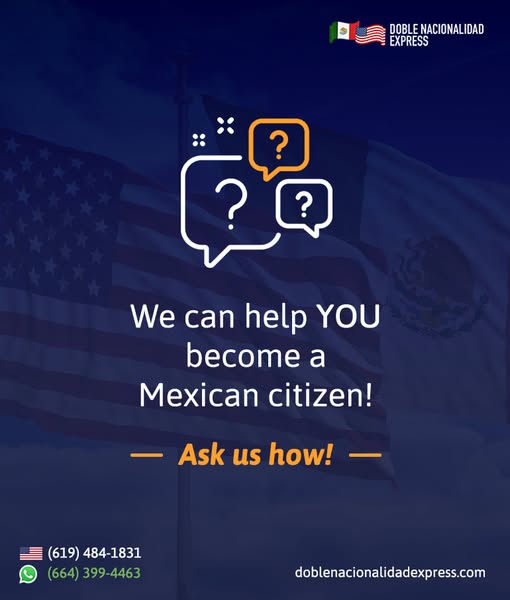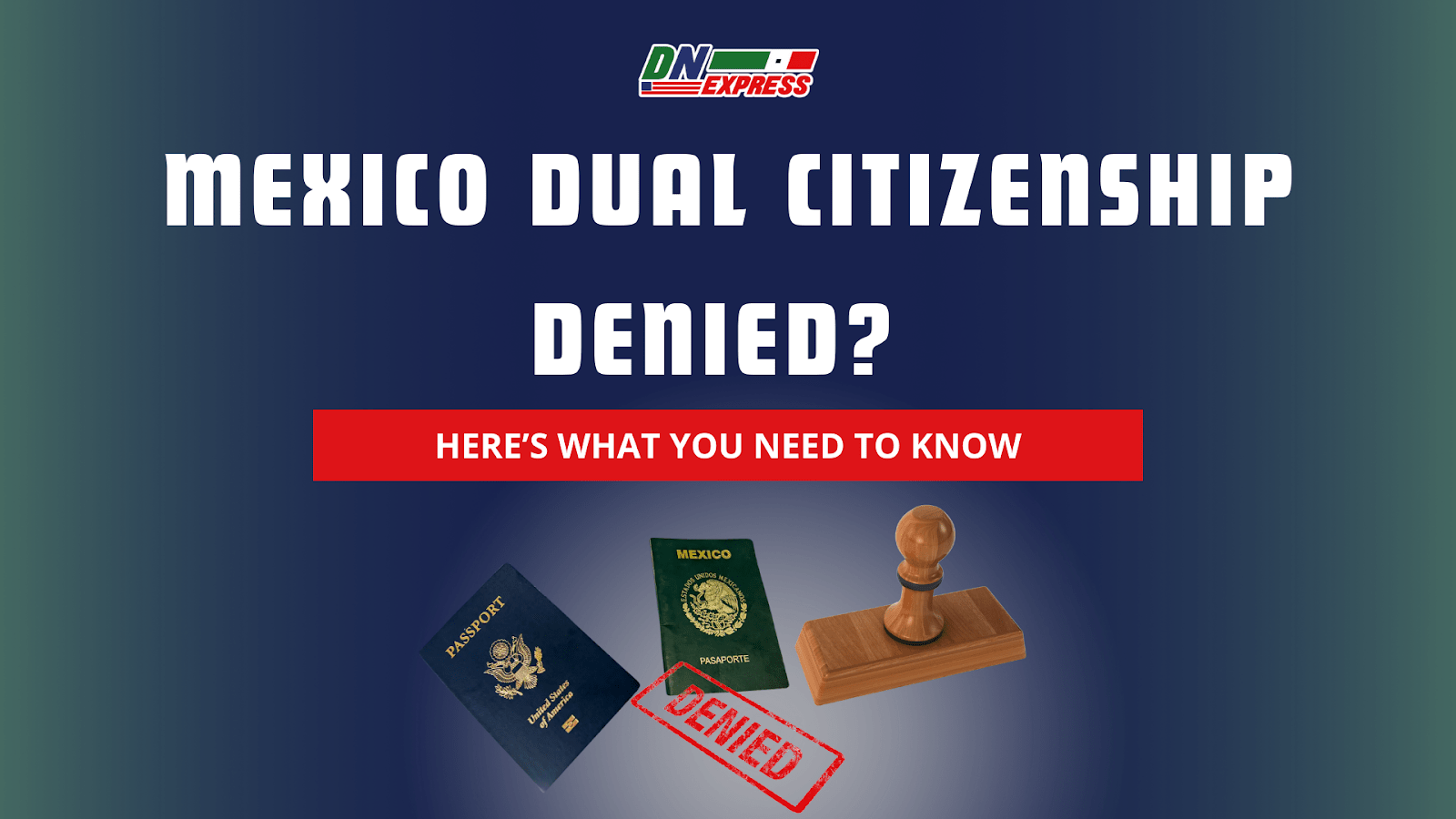
Many people are denied doble nacionalidad mexicana due to document errors, parental marital status, or consulate inconsistencies.
But most cases can be resolved with proper legal guidance, especially for the U.S.-born children of Mexican parents and those previously rejected.
If your application was denied, it doesn’t mean the end of the road. The reasons for rejection often vary, they could include unregistered births, name mismatches, or consulate mistakes.
Each can be corrected with the right strategy.
We’ve helped thousands of clients reverse denials and secure their Mexican citizenship, even in cases deemed “impossible.” Our team of licensed Mexican attorneys can handle the entire process without requiring you to visit a consulate.
Ready to understand why your application was denied and how to fix it? Keep reading for a full breakdown of common denial reasons, solutions by case type, and what steps to take next.
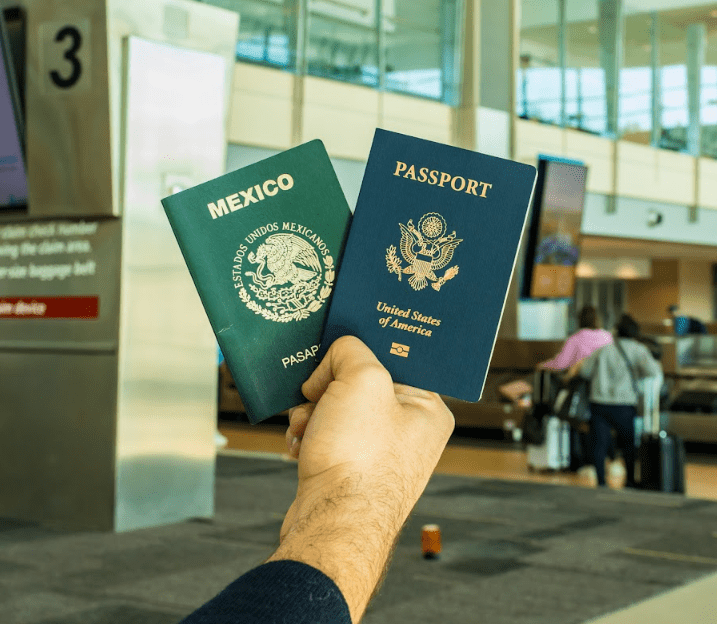
Why Mexican Dual Citizenship Applications Get Denied
It’s heartbreaking to hear from clients who were told “no” after believing they had every right to claim their Mexican nationality. But in most cases, denials don’t mean ineligibility, they mean something went wrong in the process.
Here are the most frequent reasons we see applications denied:
Missing or Incorrect Documents
Consulates often reject applications over seemingly small issues:
- A parent’s Mexican birth certificate not being found in civil records.
- Name mismatches between U.S. and Mexican documents (like “José Luis” vs “Jose L.”).
- Unregistered births abroad where Mexican parents never filed at a civil registry.
Even minor errors can trigger a denial. For example, one client’s application was rejected because their mother’s middle name was spelled “Maria” in one document and “Ma.” in another.
Consulate Inconsistencies Across the U.S.
One of the biggest frustrations is how differently consulates handle cases.
- In Seattle, we’ve seen cases denied because a deceased parent’s signature wasn’t on file, even though Mexican law doesn’t require it.
- In San Diego, a nearly identical case was approved with no questions asked.
This inconsistency leaves applicants confused and feeling like approvals depend more on geography than on law.
Parental Marital Status Issues
For children born abroad to unmarried Mexican parents, proving paternity can become a barrier. Some consulates demand additional legal steps, even if the Mexican parent is listed on the U.S. birth certificate.
We’ve helped clients overcome these challenges by obtaining legal recognition of parentage directly in Mexico, avoiding the need for parental presence.
“They told me my parents married too late, am I ineligible?”
No.
Mexican nationality law does not require your parents to have been married before your birth. If you have a Mexican parent, you’re eligible, even if they married later or never married at all.
Unfortunately, many consular staff misinterpret this, leading to wrongful denials. This is one of the most frequent errors we correct for our clients.
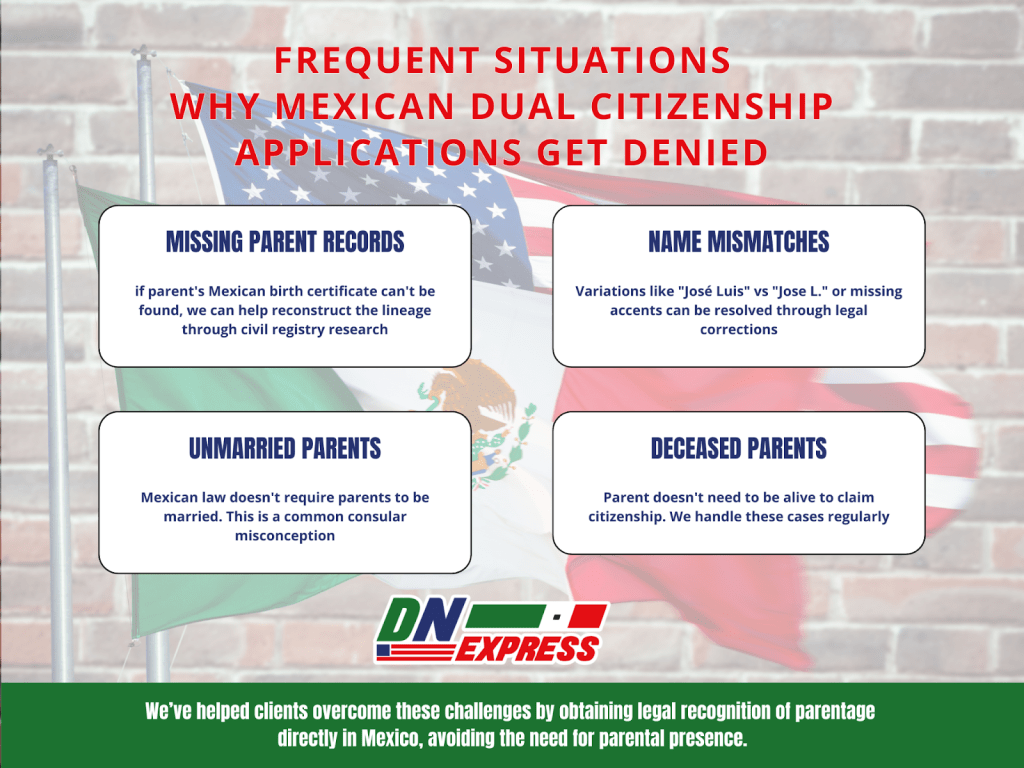
How Denials Affect Different People
Mexican dual citizenship denials don’t happen in a vacuum. The reasons, and solutions, often depend on your family situation and how your application was filed.
Here’s what we see across the most frequent cases:
U.S.-Born Children of Mexican Parents
Many U.S.-born children of Mexican parents are denied because their parents never registered their U.S. birth in Mexico.
Without this registration, consulates consider them “ineligible,” even though Mexican law recognizes them as citizens by birthright.
Another frequent barrier is:
- Consulates demanding a living parent’s consent or physical presence to process the application.
This isn’t a legal requirement, but it’s a policy some offices enforce anyway, leaving applicants feeling trapped if a parent has passed away or is unavailable.

We help families bypass these roadblocks by validating lineage directly in Mexico, no consulate visits or parent involvement required.
Adults Previously Denied by Consulates
Adults often face denials due to misfiled documents, language barriers, or outdated consular practices. One client was told they couldn’t reapply because “denials are final.”
That’s false. Mexican nationality law allows reapplication after correcting the issue.
We’ve helped hundreds of adults reverse consulate denials, even years later, by identifying the exact reason for rejection and providing the legal documentation needed to challenge it.
Parents Applying for Their U.S.-Born Children
Parents trying to secure Mexican citizenship for their U.S.-born kids often hit unique challenges:
- Proving parentage when the Mexican parent is deceased or absent.
- Navigating consulates that insist on the parent’s presence or extra affidavits.
One frequent worry we hear is “Do I need to take my Mexican parent to the appointment?”
The answer is no if handled properly.
We complete the process without requiring the Mexican parent to be involved, even in complex cases.
Mexican-Americans Reconnecting with Roots
Many Mexican-Americans denied in the past reapply later as adults to reclaim their heritage.
Their motivations often include:
- Cultural identity and a sense of belonging.
- Legal benefits like property ownership or easier travel.
Some hesitate out of fear of military service obligations or tax complications in Mexico.
The reality? Military registration is symbolic for dual nationals, and tax liabilities only apply if you reside in Mexico over 183 days a year.
Descendants of Mexican Grandparents or Great-Grandparents
We’re often asked:
“Can I apply through grandparents if my parents renounced Mexican citizenship?”
The answer is: Mexican nationality law requires at least one parent to be a Mexican citizen at your birth. Grandparent-based claims are rare unless your parents never formally lost their Mexican nationality.
Even in these cases, we’ve helped clients recover their family’s nationality by proving lineage and challenging wrongful assumptions about “renunciation.”
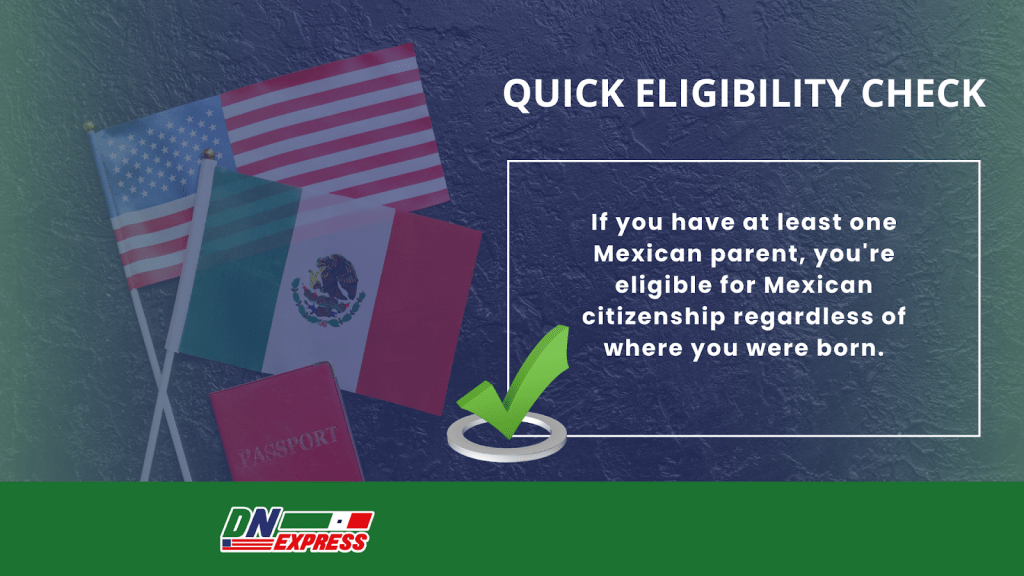
Why You Shouldn’t Give Up After a Denial
A denial from the consulate can feel like a dead end, but under Mexican law, it rarely is.
Your right to nationality as the child of a Mexican citizen doesn’t expire because of a clerical error or misinterpretation of the rules.
We’ve seen it all, cases where name mismatches like “missing” parental records, and even cases denied because a parent passed away years ago.
Each time, our team of licensed Mexican attorneys found legal solutions that consulate staff either didn’t know about or didn’t want to use.
Client Success: A Name Mistranslation Reversed a Denial
One client came to us after the consulate rejected their application, claiming their father’s name wasn’t in the Mexican registry.
The main issue? A mistranslation in the apostilled birth certificate turned “José” into “Josep.”
We appealed directly to the Mexican civil registry and corrected the record. Within months, the same client had their Mexican citizenship approved and a passport in hand, without ever stepping into a consulate.
“They told me no. DNExpress turned that no into a yes.”
We hear this every week from clients who have lost hope.
The difference is simple: where consulates stop, we keep fighting, using the full extent of Mexican law to secure your nationality.
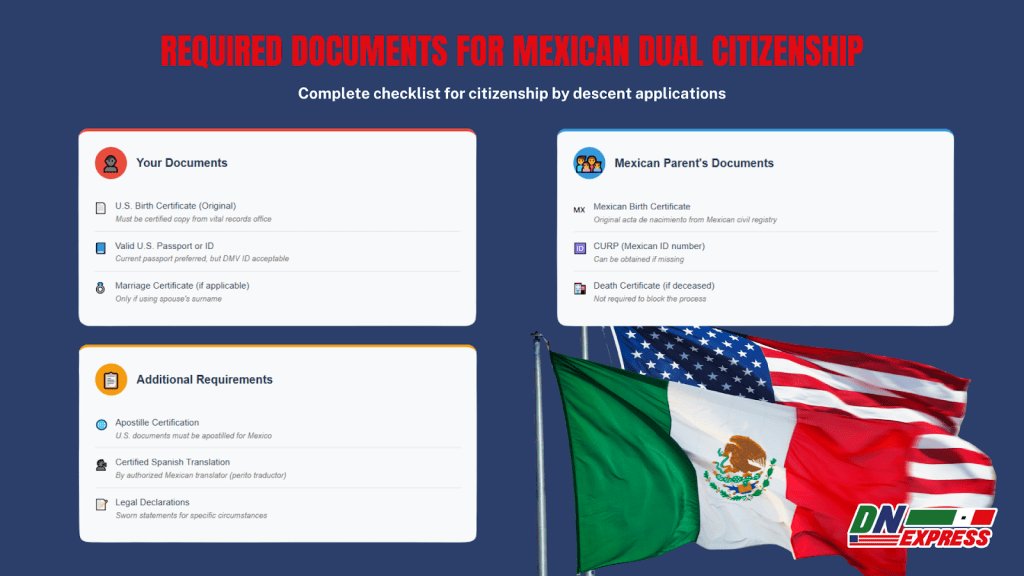
DIY vs Hiring a Legal Expert
When it comes to Mexican dual citizenship, many people try to navigate the process alone, only to hit roadblocks that cost them time, money, and peace of mind.
The Downsides of Doing It Yourself
Long Delays at Consulates
Some applicants wait 12–18 months just for an appointment, only to be told their paperwork is incomplete. Consulates often have limited staff, leading to even longer backlogs if you make a mistake.
Risk of Permanent Denial for Small Mistakes
Typos, untranslated documents, or mismatched names (like “Luis Jr.” vs “Luis Jr”) can result in rejection.
Once denied, some consulates mark your case as ineligible until you correct the error, a process that can take years.
Lack of Legal Help When Rules Vary by State
Each Mexican consulate in the U.S. applies rules differently.
What’s accepted in Los Angeles might be rejected in Houston. Without a legal team to navigate these inconsistencies, applicants are left guessing.
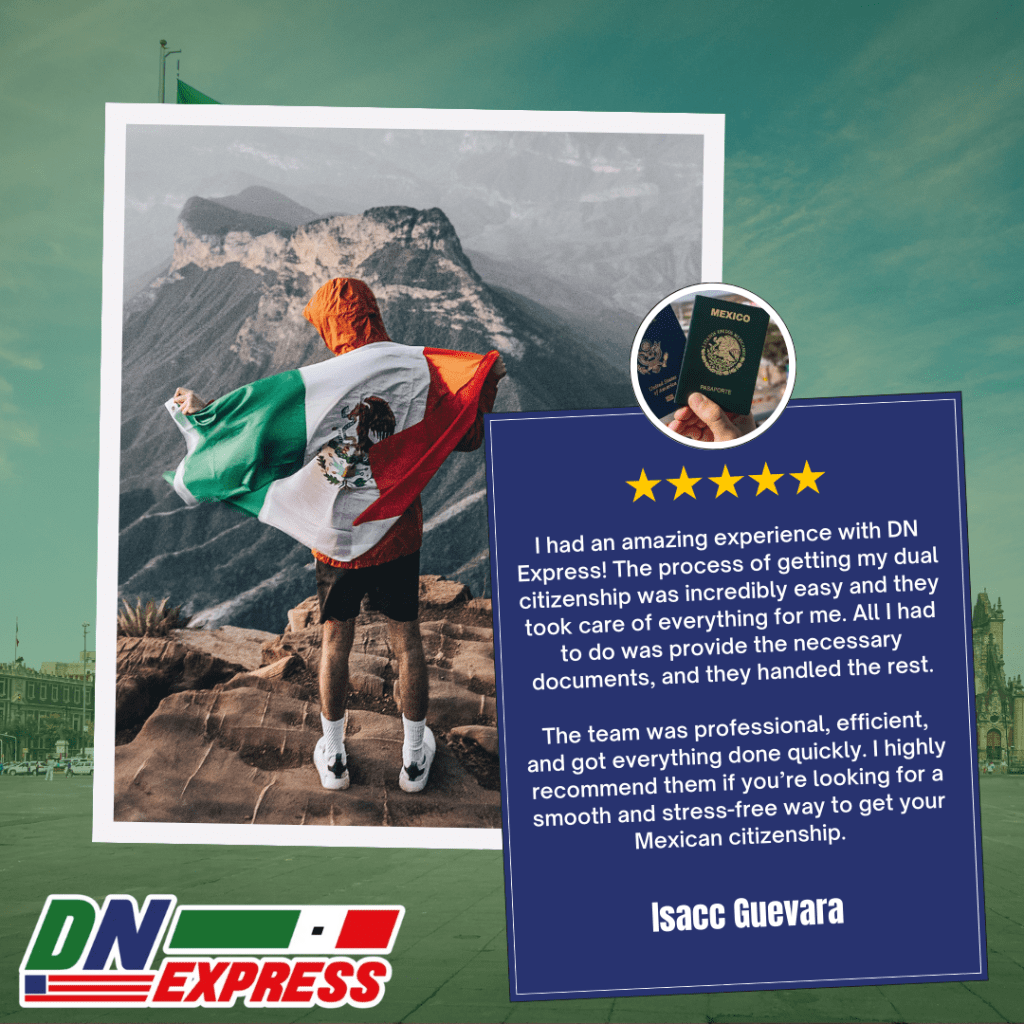
Why Doble Nacionalidad Express Is Different
We eliminate these headaches by handling the entire process for you:
- Dual citizenship without consulate visits
We process your application directly in Mexico.
- Licensed Mexican attorneys fix denied/rejected cases
Complex or “impossible” cases are our specialty.
- Fast turnarounds (8–12 weeks average)
Compared to years at consulates.
- In-house team for privacy
No third parties, no risk of lost documents.
- Affordable payment plans for families
Making citizenship accessible to all.
- Offices in the U.S. and Mexico for full coverage
Support wherever you are.
Our clients trust us because we’ve helped thousands reclaim their Mexican nationality, even those told “no” by consulates or other attorneys.
Next Steps to Secure Your Mexican Dual Citizenship
Being denied doesn’t mean you’re out of options.
We believe everyone with a rightful claim to Mexican nationality deserves a second chance, and we’ve built our entire process around making that possible.
We offer:
- Free eligibility reviews
Even if you’ve been denied before, our attorneys can evaluate your case and identify exactly what went wrong.
- Full-service support for complex cases
Missing documents, deceased parents, name mismatches, or past consulate rejections?
We handle it all without requiring you to step foot in a consulate.
Let us help you reclaim your Mexican nationality with confidence.
Message Us on WhatsApp for a Quick Response
Your roots, your rights, and your second chance start here.

Preguntas frecuentes About Dual Citizenship
Applying for Mexican dual citizenship raises a lot of questions, especially if you’ve already been denied once.
Let’s break down the most typical concerns our clients bring up and set the record straight.
Legal & Eligibility Questions
What is the new law in Mexico for dual citizenship?
Since 1998, Mexico allows citizens to hold dual nationality.
You no longer have to renounce your U.S. citizenship to reclaim or acquire Mexican citizenship.
Can a U.S. citizen have doble ciudadanía with Mexico?
Yes.
Both countries recognize dual nationality. You can be a citizen of both without any legal conflict.
Did I lose my Mexican citizenship when I became a U.S. citizen?
No.
Even if you naturalized in the U.S., Mexico considers you a national by birthright if you were born to at least one Mexican parent.
What year did Mexico allow dual citizenship?
In 1998, reforms were passed allowing Mexicans to keep their nationality while holding another.
Tax & Property Concerns
Do you have to pay taxes in Mexico if you have dual citizenship?
Not unless you’re considered a tax resident (living in Mexico 183+ days a year).
Otherwise, your worldwide income isn’t taxed by Mexico.
Do you have to have dual citizenship to own property in Mexico?
No, but without it, foreigners face restrictions on owning property near coastlines and borders.
Citizenship eliminates those barriers.
Will my U.S. taxes change if I own property in Mexico?
Owning property abroad doesn’t change your U.S. tax obligations.
However, you may need to report foreign assets if they exceed certain thresholds.
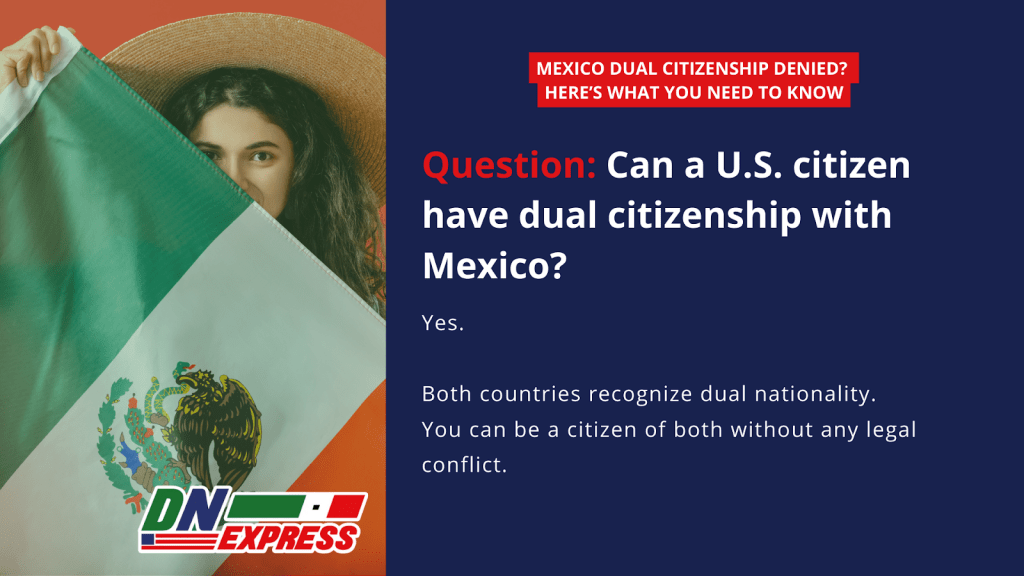
Risks & Misconceptions
Will I lose my U.S. citizenship if I apply for doble ciudadanía?
No.
The U.S. allows dual nationality, and applying for Mexican citizenship doesn’t jeopardize your American status.
What disqualifies you from dual citizenship?
The main issues are fraudulent documents, failure to prove a parental link, or serious criminal records in Mexico.
But these are minor for most applicants.
Does the US know if you have dual citizenship?
Yes, but it doesn’t act on it.
You remain a U.S. citizen with all rights intact.
Ease & Complexity
Is dual citizenship difficult to get?
It can be, especially if documents are missing or there’s been a prior denial.
That’s why legal guidance can make the difference between success and frustration.
What are two disadvantages of dual citizenship?
- Potential tax filing requirements in both countries.
- Cultural/legal misunderstandings when dealing with two systems.
What countries deny dual citizenship?
Countries like China and India prohibit dual nationality. Mexico and the U.S. do not.
